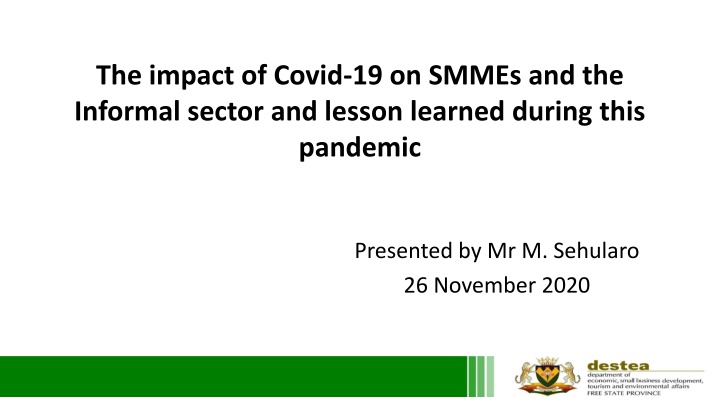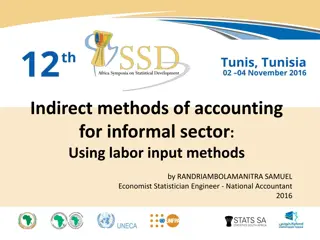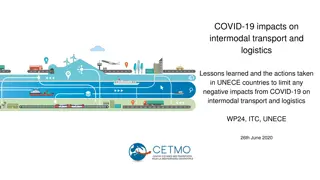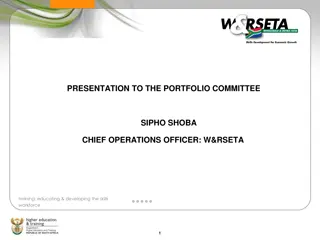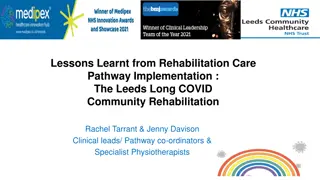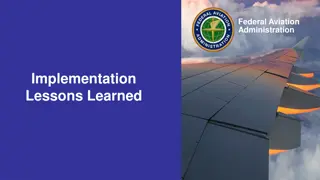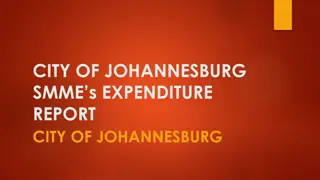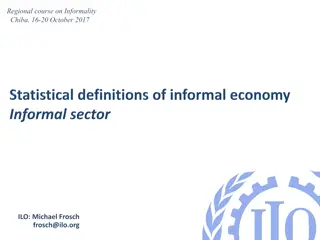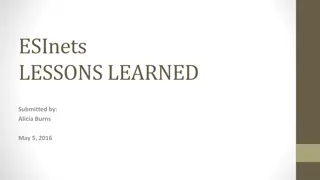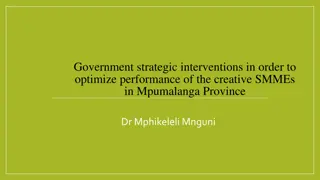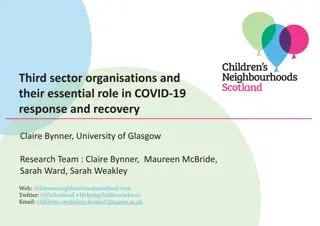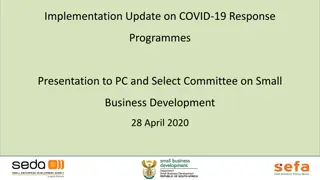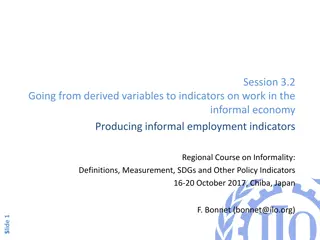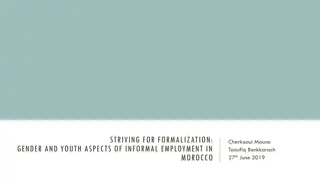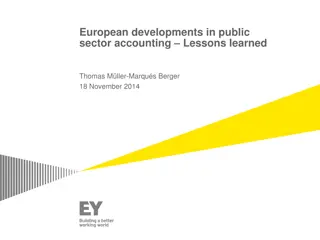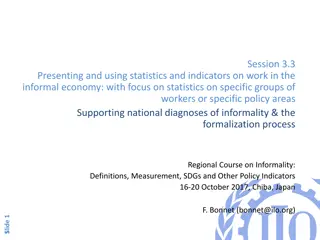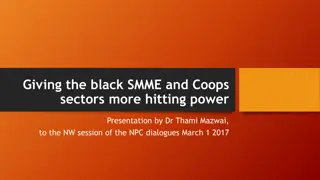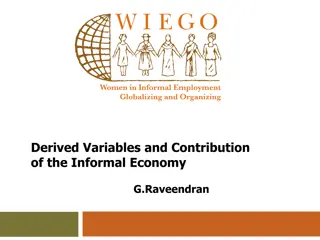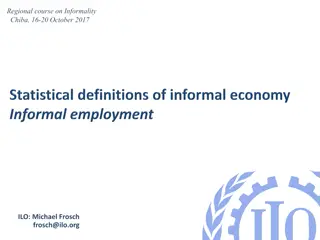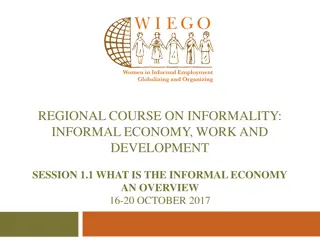Impact of Covid-19 on SMMEs and Informal Sector: Lessons Learned
The Covid-19 pandemic has severely impacted SMMEs and the informal sector, leading to economic slowdown, job losses, and disruption of supply chains. Government interventions and funding incentives have been crucial in supporting these vulnerable sectors during the crisis, highlighting the importance of collaboration and swift action in mitigating the effects of such global emergencies.
Download Presentation

Please find below an Image/Link to download the presentation.
The content on the website is provided AS IS for your information and personal use only. It may not be sold, licensed, or shared on other websites without obtaining consent from the author.If you encounter any issues during the download, it is possible that the publisher has removed the file from their server.
You are allowed to download the files provided on this website for personal or commercial use, subject to the condition that they are used lawfully. All files are the property of their respective owners.
The content on the website is provided AS IS for your information and personal use only. It may not be sold, licensed, or shared on other websites without obtaining consent from the author.
E N D
Presentation Transcript
The impact of Covid-19 on SMMEs and the Informal sector and lesson learned during this pandemic Presented by Mr M. Sehularo 26 November 2020
The impact of Covid-19 on SMMEs and informal sector According to the African Development Bank s 2020 African Economic Outlook (AEO), Africa s economic growth remained stable in 2019 at 3,4% and was expected to rise up to 3,9% in 2020 and 4,1% in 2021. unfortunately, the COVID-19 pandemic is an unprecedented global crisis which has not only affected businesses negatively, it has affected the world s economic welfare across the globe and placed serious implications on people s health. The pandemic resulted in SA s economic slowdown, affecting trade, investment, growth and employment. South Africa is still haunted by multiple inequalities of access to economic and social opportunities, particularly for women and youth, and amongst them those with disabilities. The economic ramifications of the pandemic quickly became apparent with SMMEs being on the front line. According to Organisation for Economic Co-operation and Development (OECD) analysis, SMMEs that provide 60-70% of jobs in the country (with informal employment being the main source of employment accounting to 85,8% of employment) account for the majority in sectors particularly affected by the crisis, which, includes transport, manufacturing, construction, wholesale and retail, accommodation, real estate, and other personal services. This situation is causing significant loss of income, massive unemployment and about half of the economic activities have been put under stress with supply chains and value chains disrupted.
Opportunities Experienced During Lockdown SMMEs and Informal sectors have been particularly vulnerable to the impacts of the crisis whereby supply and demand have serious economic effects in the private sector, especially for SMMEs and informal sectors. With fewer resources to ride out the storm, the government placed measures to assist Small, Medium and Macro Enterprises in mobilising, stabilising, securing jobs and assisting workers to return to work under these circumstances. DESTEA has created a conducive environment in which SMMEs are made aware of what the government, is doing and created a platform where different funding support can be retrieved. DESTEA went on to introduce 4 different funding incentives to SMMEs and informal sectors to ensure that there are no retrenchments and help reduce the rate of unemployment. The funding incentives available are; Covid-19 Risk Sharing Incentive Enterprise support incentive Spaza shops and general dealers incentive Informal business support incentive DESTEA has worked together with SEDA and DSBD in ensuring that applicants are assisted in registering their businesses on CIPC, for tax clearance, on CSD and also assist with business plans. The DESTEA, took swift action to contain the spread of the virus by introducing these funding incentives along with non-financial support.
Opportunities Experienced and lesson learned During Lockdown The government assisted companies facing the distress through the Unemployment Insurance Fund. Within the realm of the budget, workers who had lost their jobs received a small monthly payment during the harsh lockdown levels. Furthermore, solidarity funding was introduced to help combat the spread of the virus, which was created with assistance of private contributions. The tax front, the revenue administration accelerated reimbursements, tax credits and allowed SMMEs to defer certain tax liabilities. The authorities have released partial cost estimates for the measures, so far amounting to ZAR 12 billion (0.2 percent of the GDP). .
Lesson Learned on the Ground Over the long term, SMMEs should pursue new opportunities which will help drive the necessary change in the business. SMMEs need to learn new skills that will be used to progress the business further. A crisis like this brings new opportunities and should be a trigger to explore new directions, basically, change will become the new focus. DESTEA and its partners has started and will continue to invest more over the time to help mitigate the impact of Covid-19 on SMMEs and Informal Traders. Also, the government will continue to conduct trainings on financial management, customer care and understating the operational environment especially for the informal sector, this will help empower them and bring confidence in their businesses. Therefore, SMMEs and the Informal traders should; Unlock the potential of South African Entrepreneurship Expand support programme Create an enabling environment Enhance competitive and capabilities of SMMEs (SMMEs must be encouraged to venture into new opportunities that suit the current, pandemic, situation) and Maintaining the economic fabric by limiting the burden of operational costs, enhance opportunities to keep businesses afloat and maintain a certain level of activities (new activities, health and safety measures, and so on)
The next slide focus on our budget and expenditures for both SMMEs and Informal traders
STATUS REPORT NO. FUNDING INCENTIVES BUDGET NUMBER OF TOTAL PAID TO DATE BUSINESSES PAID Enterprise Development 137 R 20 587 978.00 1. R28m Risk Sharing 15 R 15 842 771.80 2. R25m Tuckshops 123 R 929 100.00 3. R5m Informal Business 194 R 526 550.00 4. R3m 469 R 37 886 399.80 TOTAL
